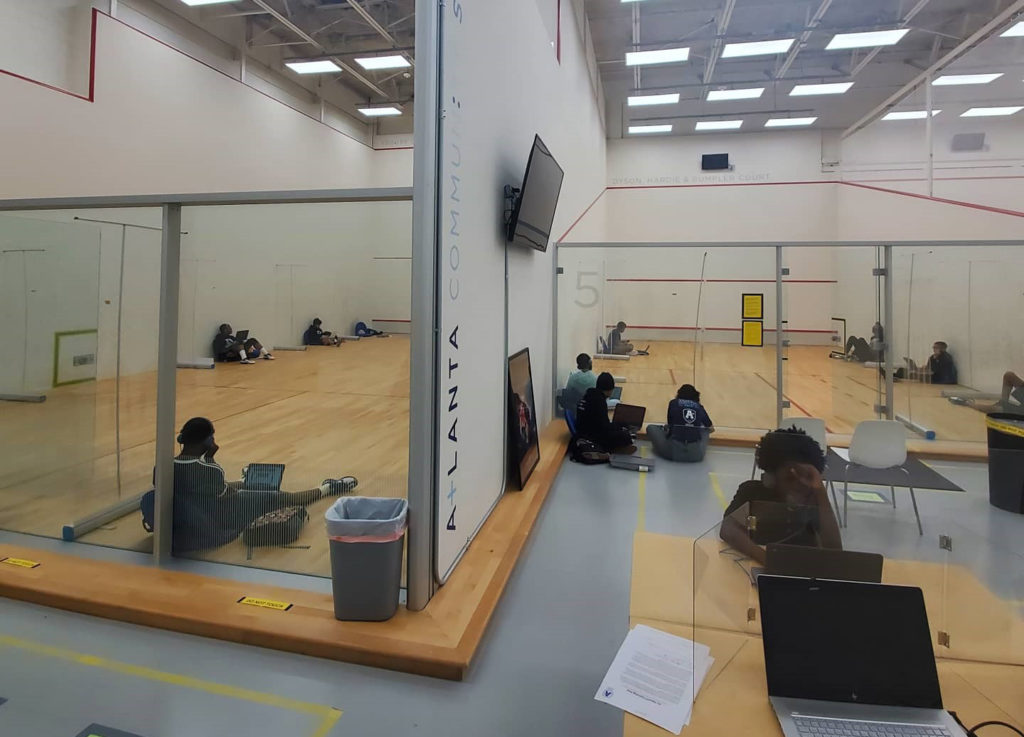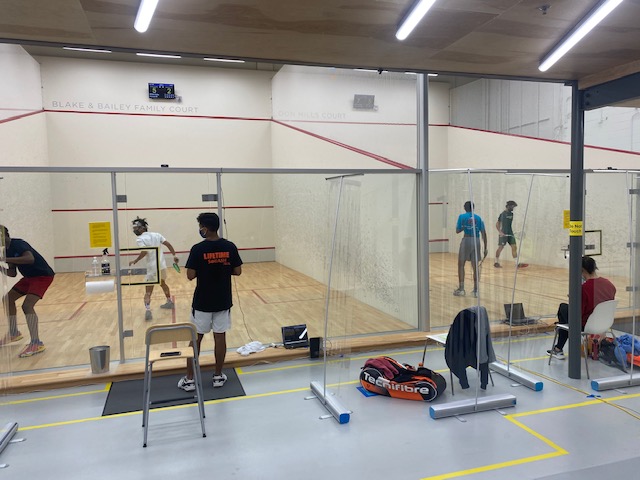
Shortly after its grand opening in January 2020, Atlanta Community Squash (ACS)—which over a year ago was the first facility to join the US Squash Community Affiliate Network—was forced to adapt during the pandemic to serve the squash community’s health and academic well-being by implementing an innovative squash and learning pod structure to safely provide their members and students with a vital outlet.
The vision of ACS was to build vibrant community membership centered around A+ squash, an afterschool program focused on academics, athletics and achievements. The ACS facility houses five singles courts and one hardball doubles courts in a warehouse-style building. Like most programs around the country, Atlanta Community Squash was forced to shut its doors in March due to the pandemic after just a few months of initial programming. In May, Georgia allowed gyms and fitness centers to resume operation, opening the door for ACS to become one of the first facilities in the country to return to programming. That month, the club brought in the experienced Mark Heather as the General Manager and Director of Squash who, along with A+ Academic Director Hannah Vernex-Loset, began planning what a return to programming would look like.
A medical advisory board was created to inform the safety protocols of all programming. In accordance with state and US Squash guidelines, the club opened initially with only solo practice for its members in May, which progressed through the summer. As the school year began, it quickly became clear that the academic and familial well-being of A+ students was an immediate concern. As play for the membership expanded to allowing household pods to play with each other, Heather and Vernex-Loset devised a similar learning pod system starting in September, maximizing the facility’s open spaces, including the squash courts.
What had been strictly an after school program pivoted to hosting students from 7:30am to 4:00pm from June through December. The facility invested in protective equipment to create safe individual learning spaces and developed strict entry and movement protocols to ensure proper distancing. A private bus company was hired to set up to pick up and drop off kids every day. The facility’s classroom was converted into a kitchen that provided daily breakfast and lunch, and four of the six squash courts housed the learning pods where students could attend their virtual classes and work on assignments.
“We had some kids who had attended zero classes when they started coming to the learning pods,” Vernex-Loset said. “By mid–December, those same kids were passing their classes with B’s and in some cases A’s and attending every single class. The pandemic was crippling for those who were already struggling students or had learning disabilities. For them to be able to come here and receive help joining their Zoom call or figuring out which class they needed to be in—that was just huge. When one senior came to the learning pod in September, he was failing a couple of courses and wasn’t on track to graduate. He passed all of this courses and took an additional course to put him in a comfortable position to graduate this May.”
The learning pods structure benefited all members of A+ families. Many parents were able to work day shifts instead of taking night shifts because they knew their kids were safe at Atlanta Community Squash during the day. Families who struggled with remote learning from home were able to get back on track after the introduction of learning pods. The system strengthened relationships with local schools who saw the direct impact the ACS learning pods had on their students.
“The impact on each family was different,” Vernex-Loset said. “A lot of A+ families are single moms or grandmothers, so the generational and technological gaps could be huge. Some of the grandmothers would lose their kids due to technology. It was difficult time for a lot of families, and it was nice to just see the smiles back on kids’ faces again. Once everybody started getting into a groove, we were able to incorporate some more structured squash.”

The positive impact of the learning pod structure on A+ students became a rallying cry for the greater ACS membership, with many adults and students volunteering their time on the squash court or in the classroom.
As the year progressed programming slowly expanded. Household pods expanded to pods of trusted groups. In November, a US Squash/College Squash Association College Showcase was held, and a junior tournament is set to take place at the end of February. In recent weeks, school programs, whose courts have remained closed, have been able to practice during the evening and stage their first competitive team matches of the season. According to Heather, the facility is already exploring future programming with local colleges and a YMCA. The membership itself has more than doubled in size over the past year.
“It’s been a dream come true for me, especially right now,” Heather said. “I’ve been in the U.S. for almost twenty-five years and had the pleasure to work at some great clubs and programs in different areas and with different models, but it’s really special to be involved with a facility that’s bringing it all together. It’s a challenging time to be getting a new club up and running, but they’re great challenges to have and I love the vision of what we’re trying to do here. I was surprised to see how big the squash community is down here when I arrived. It’s a very supportive community, many of our initial members were also members at other local clubs. But now that we’re up and running we’re seeing an influx of newcomers to the sport, or people who are just moving to the area. We’re not only growing our membership, we’re actually expanding squash in Atlanta.”
________________________________________________________________________
ACS is a member facility of the US Squash Community Affiliate Network. The Community Affiliate initiative begins the process of developing more formal relationships with key regional facility partners that are closely aligned with US Squash’s mission of promoting squash’s growth and development by increasing access and awareness, supporting meaningful lifelong engagement in the sport, and encouraging sportsmanship while achieving competitive excellence.
Community Affiliates conduct US Squash programs and activities to build the sport, inclusive of junior scholastic squash team programs, junior squash grassroots development and high-performance programs, squash and education programs, adult squash development, and accredited leagues, ladders, and tournaments. Community Affiliates receive programmatic assistance including US Squash software and support services, regional and national promotion, and coordination on pilot programs focused on creating and testing best practices for growing the sport.











